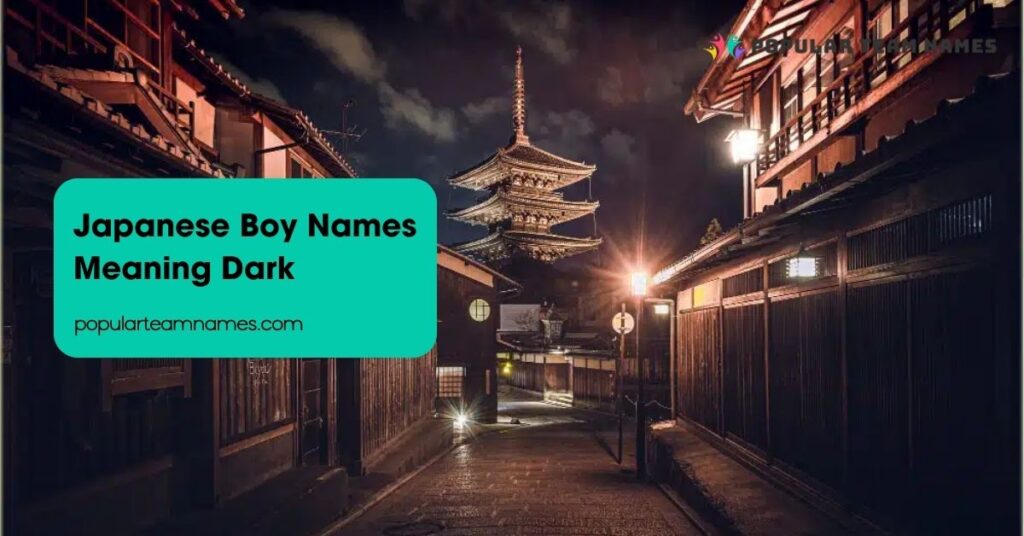Choosing the perfect name for your baby boy is a important decision, and if you’re drawn to names that evoke mystery and depth, Japanese boy names meaning “dark” might just be what you’re looking for. These names not only carry unique sounds but also rich cultural meanings that can resonate beautifully with your family’s values and traditions.
Imagine giving your child a name that reflects strength and elegance, rooted in the enchanting industry of Japanese language and culture. From names that symbolize the night sky to those that embody the essence of shadows, each option tells a story waiting to unfold. Jump into this captivating area and discover the perfect name that captures the essence of dark beauty for your little one.
Exploring Dark Names in Japanese Culture

Japanese culture deeply embraces the concept of darkness in names, often seeing it as a source of beauty and strength. Names reflecting darkness can convey layers of meaning, connecting to both nature and personal attributes.
Significance of Darkness in Japanese Names
Darkness holds a profound significance in Japanese names, embodying mystery and elegance. In many cases, the night sky is seen as a canvas that inspires awe and reverence. Such names can symbolize a child’s potential, suggesting deep insights or quiet strength. Through these names, parents often express a hope for their child to embody the positive aspects of darkness, promoting resilience and depth of character.
Cultural Connotations of Dark-themed Names
Cultural connotations tied to dark-themed names often include elements of nature and mythology. Shadows, for instance, can evoke images of protection and calm, reflecting a safe haven during nightfall. These names can also align with traditional stories, where characters associated with darkness often possess wisdom or strength. Japanese poetry frequently celebrates themes of night, where darkness symbolizes peace and the unknown. By choosing a dark-themed name, you can connect your child to these rich cultural narratives, ensuring their name carries weight and significance.
10 Japanese Boy Names That Mean Dark

Explore these unique Japanese boy names that embody the essence of darkness. Each name carries rich meanings and cultural significance, perfect for parents looking for something profound.
1. Daiki: Great Radiance in Darkness
Daiki signifies great radiance even amidst darkness. This name beautifully contrasts light and dark, suggesting strength and resilience.
2. Hayate: Swift Wind of the Night
Hayate means swift wind of the night, evoking a sense of movement and mystery. You’ll appreciate how it captures the essence of nighttime adventures.
3. Kuro: Black as Night
Kuro translates to black, representing the color of the deep night. It’s a straightforward choice that conveys boldness and simplicity.
4. Raito: Light in the Darkness
Raito stands for light shining through darkness. Choosing this name reflects hope and optimism, making it a lovely option for your child.
5. Seiki: Dark Spirit of the Industry
Seiki embodies the dark spirit of the industry. This name appeals to the idea of hidden strengths and uncharted territories.
6. Shinya: True Night
Shinya signifies true night, capturing the elegance and mystery of the nighttime. It’s a name that invites exploration and wonder.
7. Takumi: Artisan of Darkness
Takumi suggests an artisan of darkness, hinting at creativity and craftsmanship. This name resonates with those who appreciate artistry and expression.
8. Yoru: Night’s Embrace
Yoru translates to the embrace of night. You’ll find its soothing connotation comforting, as it symbolizes peace and calm.
9. Riku: Land of Shadows
Riku means land of shadows, invoking images of serene landscapes. This name reflects the beauty found in the shadows of nature.
10. Kage: Shadow’s Essence
Kage represents the essence of shadows. This name conveys a subtle yet powerful presence, connecting your child to a deeper narrative.
Choosing the Perfect Name

Selecting a name for your baby boy is an exciting journey. A name holds deep personal and cultural significance, especially when you’re exploring Japanese names that mean dark.
Factors to Consider in Name Selection
Consider the meaning that resonates with you and your family. Dark-themed Japanese names often convey elegance, strength, and a connection to nature. Focus on how the name sounds as well. Names like Kuro (black) or Yamiyo (darkness of night) have unique phonetics that can be appealing. Think about potential nicknames as well. Names like Mei (dark, mysterious) can lead to cute, easy-to-pronounce variations. Cultural significance also matters, as some names reflect deep myths or histories, connecting your child to their heritage.
Tips for Parents on Name Meaning and Sound
Start by researching each name’s meaning; deep meanings add layers to your choice. You might explore how names like Kurayami (pitch-black) tie into broader cultural narratives. Balance the sound with the meaning. Names with softer sounds, like Kage (shadow), can evoke feelings of calmness. Don’t forget to consider the initials and how the full name sounds together. Test it out loud to ensure it flows naturally. Finally, select a name that feels right to you. Trust your instincts; whether it’s Akuro (wicked road) or Tsukiyo (dark night), the best choice is the one that resonates with your family story.
Conclusion: Embracing Japanese Boy Names Meaning Dark

Selecting a name that embodies darkness can enrich your child’s identity with depth and significance. Japanese boy names that mean dark not only sound beautiful but also carry profound cultural narratives. They invite your child to embrace the mystery and elegance of their name, connecting them to nature and mythology.
By choosing a name like Kuro or Hayate, you’re not just picking a label but instilling a sense of strength and resilience. These names reflect a rich heritage that celebrates the beauty found in shadows. As you explore these unique options, trust your instincts to find a name that resonates with your family’s story and values.
Frequently Asked Questions
What is the significance of choosing a baby boy’s name in Japanese culture?
Choosing a baby boy’s name in Japanese culture is significant because names often carry deep meanings and reflect family values. Names can symbolize elements like strength, beauty, and aspects of nature, allowing parents to connect their child with rich cultural narratives.
Why are names that mean “dark” considered beautiful?
In Japanese culture, names that mean “dark” signify beauty, strength, and mystery. Darkness is often associated with elements like the night sky and shadows, which can symbolize protection and calmness, enhancing the child’s potential and resilience.
Can you give examples of Japanese boy names that mean “dark”?
Sure! Some examples include Daiki (great radiance in darkness), Kuro (black as night), Hayate (swift wind of the night), and Shinya (true night). Each name embodies unique meanings and cultural significance related to darkness.
How do I choose the right Japanese name for my baby boy?
When choosing a Japanese name, consider its meaning, how it resonates with your family values, and its phonetics. Research each name’s significance and think about potential nicknames to find a name that feels right for your child.
What themes do dark-themed names often explore?
Dark-themed Japanese names often explore themes of nature, mythology, and elegance. They convey mystery, creativity, and the beauty found in shadows, allowing parents to select names that reflect their child’s personality and potential.
How can dark-themed names symbolize resilience?
Dark-themed names in Japanese culture symbolize resilience by connecting to the idea that darkness can protect and offer calm. They express strength and the potential within, showing that beauty can emerge from shadowy elements.
Are there benefits to selecting culturally significant names?
Yes, selecting culturally significant names can foster a sense of identity and belonging in children. These names often carry rich history and meaning, connecting the child to their heritage and family narrative.
What should I consider about the sound of a name?
Consider how the name sounds when spoken aloud, including its flow and rhythm. A pleasing sound can enhance the overall feel of the name, making it memorable and endearing for family and friends.
Should I test how the name flows with the last name?
Absolutely! Testing how a first name flows with the last name is crucial. Pay attention to both the sound and cadence, as harmonious combinations can make the name more appealing and easier to pronounce.
Is it important to trust my instincts when choosing a name?
Yes, trusting your instincts is vital. A name that resonates on a personal level can have special significance for your family. Ultimately, select a name that feels right emotionally and culturally for your child’s identity.







